Published May 5, 2017
RETRO INTERVIEW with F. Murray Abraham
RETRO INTERVIEW with F. Murray Abraham
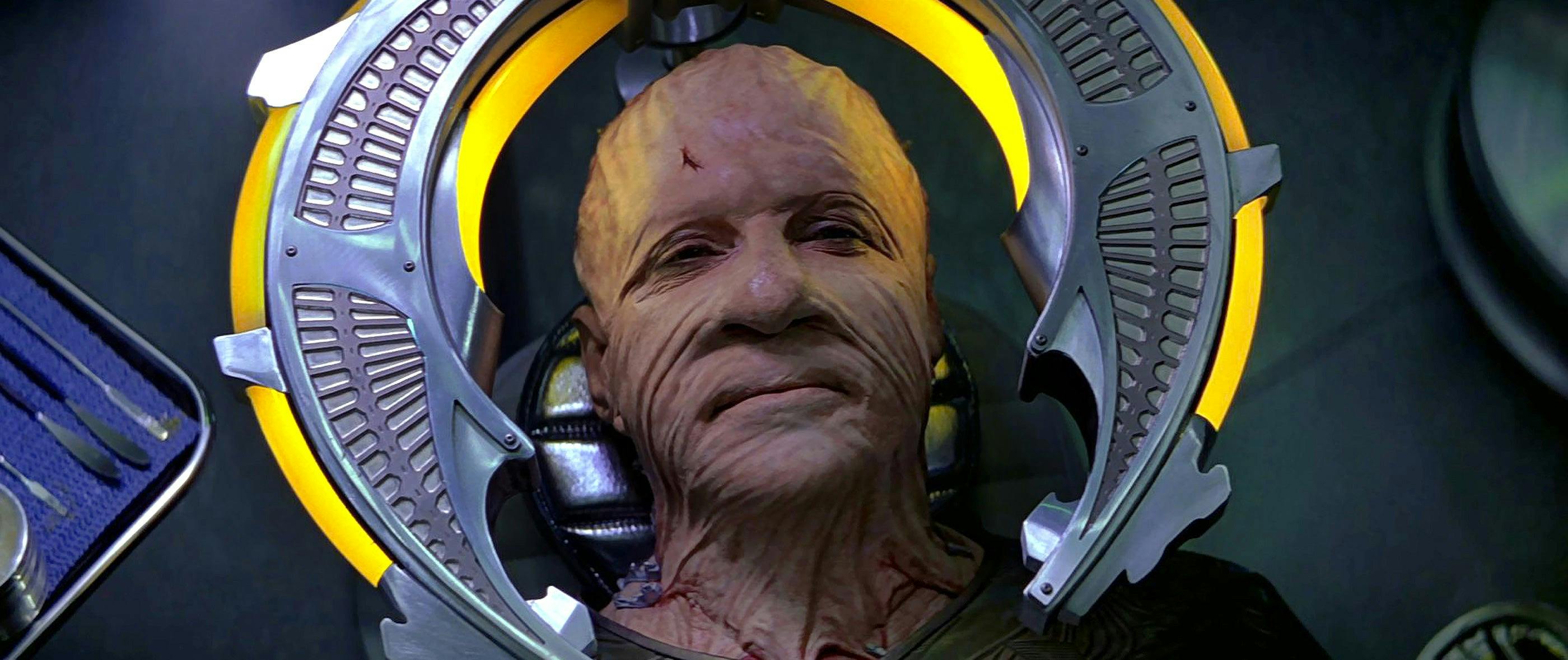
StarTrek.com is pleased to share our latest retro interview. This time, it's with F. Murray Abraham, the formidable Oscar-winner who played Ru'afo, the main villain in Star Trek: Insurrection. The actor, now 77, is best known for his performances in such films and TV shows as Scarface, Amadeus (for which he won his Academy Award), Last Action Hero, Inside Llewyn Davis, The Grand Budapest Hotel, The Good Wife, Louie and a long stint as Dar Adal on Homeland, not to mention numerous Broadway and off-Broadway shows, among them Angels in America, Uncle Vanya and It's Only a Play. This interview, conducted by Ian Spelling, ran in 1999 on the pages of the official, licensed Star Trek Monthly magazine published by Titan Magazines, just as the latest Star Trek: The Next Generation feature reached theaters.
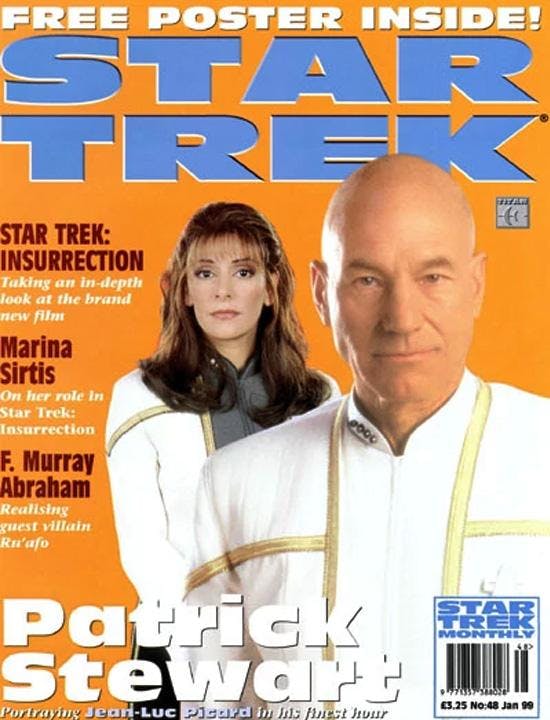
“How did I come to be in Star Trek: Insurrection?” asks F. Murray Abraham, who co-stars as the villainous Ru’afo in the latest Star Trek: The Next Generation big-screen adventure. “I was invited! They simply asked me to be involved in it. I’d actually known some of the people who are a part of it for some time. I did some Chekhov, a wonderful piece called The Seagull, with the gentleman who plays Data – Brent Spiner. We hit it off. He played my possible son in The Seagull, but there was some doubt a to whether or not his character was my son in the play.
“But Brent and I had a really strong connection, and we’ve kept in touch over the years. That’s one reason I’m in the movie. I met Patrick Stewart, I guess it was a couple of years ago now, and we just happened to have the same ideas about theatre and about work and discipline. When I new these people were involved in Star Trek: Insurrection, I knew it would not just be a lark.”
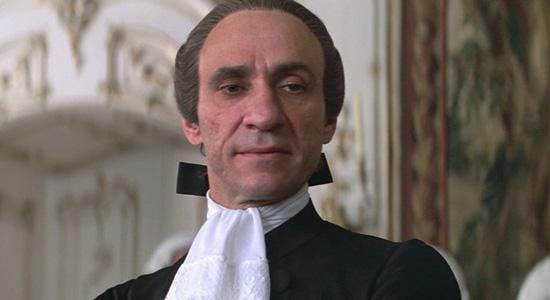
Moviegoers, theatre enthusiasts and television watchers across the globe are surely familiar with Abraham, perhaps best known for his Oscar-winning performance as Antonio Salieri in Amadeus. The veteran actor, who was born in Pittsburgh, Pennsylvania, and is of Italian and Syrian descent, made his stage debut in a Los Angeles stage production of Ray Bradbury’s The Wonderful Ice Cream Suit and counts among his numerous stage credits all the major works of Shakespeare, The Fantasticks and Waiting for Godot, the upcoming television mini-series Noah and such films as Serpico, The Sunshine Boys, Scarface, The Name of the Rose, The Last Action Hero, National Lampoon’s Loaded Weapon 1, Mighty Aphrodite and Looking For Richard, as well as the genre entries Mimic and Slipstream.
Produced in 1989, Slipstream was a well-regarded, low-budget science fiction/action film that went unreleased in the United States despite a cast that included Mark Hamill, Bill Paxton, Robbie Coltrane, Ben Kingsley and Abraham. Mimic centered on Mira Sorvino as an entomologist – mentored by Abraham – who genetically engineers a cockroach designed to eradicate other, disease-carrying cockroaches, only to watch in horror as three years later, the new roaches breed, kill and, worse, assume Human form. A moody, atmospheric film, Mimic went pretty much unnoticed upon its release in 1997.
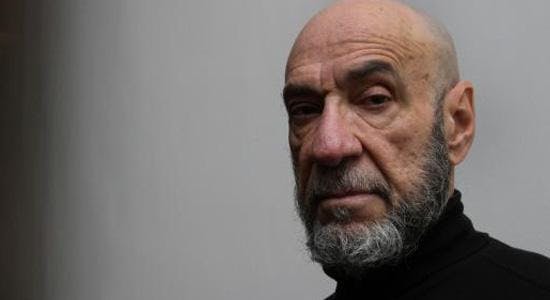
“I guess Slipstream and Mimic, among my films, are my only genre credits,” Abraham notes. “I’ve recorded a considerable number of books [as audiotapes], and among them have been stories by Ray Bradbury. I thought Slipstream was a very underrated film. I have fond memories of it because I worked with the young man who played Luke Skywalker, Mark Hamill. That was one day’s work for me, you know. There was a period in my life when I was being flown all over the world – for enormous amounts of money, which I’ve already spent! – to do one or two days on these very exotic films. Slipstream was one of those films. Mimic was directed by Guillermo Del Toro, who is a young Mexican. I speak fluent Spanish, so when Guillermo and I met it was like cousins coming together. I happen to think he’s a great director with a great energy and intelligence that he brings to the set. I thought the film got a bum ride.”

Despite the less than stellar fates of his previous genre efforts, Abraham jumped at the chance to play Ru’afo in Star Trek: Insurrection. There was just one little problem: “I didn’t really know Star Trek: The Next Generation,” the actor admits. “I didn’t follow it closely, but I do have among my friends people who now reveal themselves as Star Trek Fans. But they wouldn’t let me know before!
“It was really interesting,” he reveals. “I do a lot of work in Italy. I do at least a film a year there, and have for over 20 years. I have cemented relationships with some extremely sophisticated Italians who are world travelers. I was doing a picture there recently, and when I let my friends know that I was working on the next Star Trek picture, they revealed to me that they were Star Trek fans. They started to bring out paraphernalia. It’s really funny how people kind of keep it behind locked doors until they realize they’re among friends. It’s a little bit of a cult thing to some people, and it’s thrilling. It’s a world that you’re suddenly allowed entrance into that you never had entrance to before.
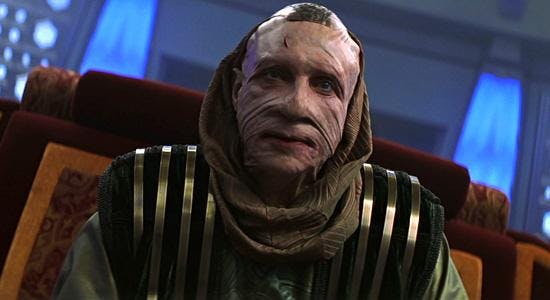
“I immediately went back and watched Star Trek: The Next Generation films and [episodes of] the series,” he recalls. “I knew the original show rather well. It was a part of our lives, really. I’d worked with Leonard Nimoy on a mini-series he called Marco Polo. We met and became friendly over the years. He’s just a remarkable man, very generous. So I didn’t know too much about TNG, but once I was invited to be a part of this project, I made it my business to learn more about it.
Abraham also set about understanding Ru’afo as best as he possibly could. The character fascinated him because, in typical science fiction/Star Trek fashion, Ru’afo was so relevant to what’s going on in the world today. “Ru’afo practices one of the Seven Deadly Sins to such an extent that he becomes warped and out of touch with Humanity. He becomes something other than Human because of this sin that the practices, which is the sin of pride,” he says. “Not only that, Ru’afo and his race practice vanity to such an extent that they don’t even see their own ugliness. To me, it’s a great parallel to this so-called ‘Beauty Culture’ that we are all apparently fascinated with now, and have been for generations.”
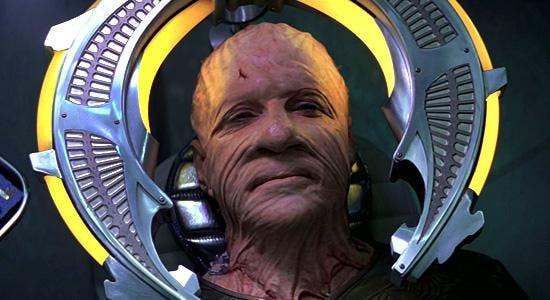
Transforming himself from thespian to Ru’afo involved several hours spent each day in a makeup chair as prosthetics were applied. It’s a process that Abraham had undergone several times in the past. “But,” Abraham stresses, “those other times were nothing like this. How do I describe Ru’afo? His costumes are just fine. His face? If you were to visualize the most warped face-lifting job you’d ever seen, then multiplied that by about 100, you’d get an idea of what Ru’afo looks like. My eyes come through, though, I’ve been told. There’s something about me that’s still me. In those terms the makeup really works.”
Considering that Abraham as been around so long, and that he’s tackled so many classic characters, one can’t help but wonder if he takes a character like Ru’afo or a film like Star Trek: Insurrection as seriously as he might take, say, a character like Richard III or Macbeth, or a film like Amadeus. “I must tell you that I have discovered, after almost 40 years in the business, the trick is to come into a project completely prepared and then to just have a good time," he comments. "That’s the key to the Star Trek: Insurrection set.
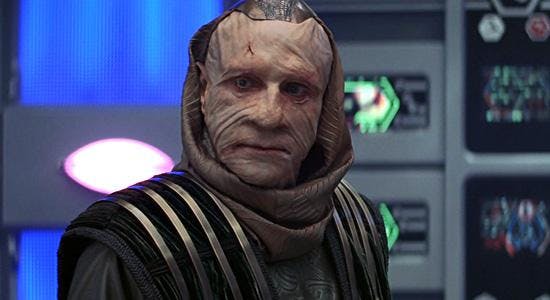
“I sensed a great joyousness and a very positive spirit, which is very rare in films,” he recounts. “People take themselves far too seriously. But these Star Trek people are absolute pros. They know exactly what they’re doing. They trust and know each other, so it allows a certain freedom, a certain oxygen that comes from this free spirit. I’m absolutely serious. I guess the point I’m trying to make is that they were all very welcoming of me.”
Abraham, who will be next seen on television alongside Jon Voight in the mini-series Noah, as well as the upcoming films For Love or Mummy and Excellent Cadavers, is on a roll that carries this interview to its conclusion.
“There are interconnections in this business, in our lives, if we’re in this business long enough,” he explains. “The man I worked with quite a bit on Star Trek: Insurrection was Anthony Zerbe [as Starfleet Admiral Daugherty]. He and I were both doing Cyrano [de Bergerac] at the same time, many years ago. He sent me a note because he was two weeks ahead in rehearsals and in a different part of the country. The note he sent said, ‘You’re going to be quite wonderful’, or something like that. It was a very generous statement from another Cyrano.
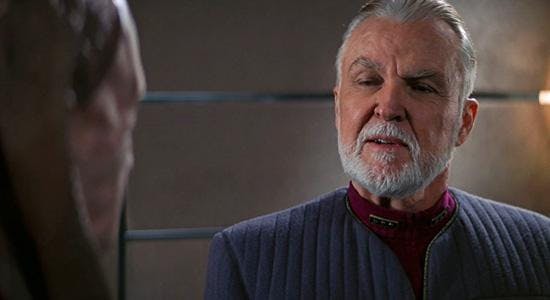
“We never really knew each other until years after, when we were working on Insurrection. It so happens that Cyrano wrote the first science fiction story, by the way. This may all sound silly to someone who doesn’t believe in a sense of community, but I felt very close to Anthony because of that. It turned out that we’ve become great friends.
“It’s a great thing when you have a unit like the Star Trek: The Next Generation cast. Jonathan Frakes used to sing baritone in musical comedy, and he’d just burst into song on the set. We’d all start doing these choruses and duets. The cast are a family, and they made me feel like a part of that family. I told them, ‘If this is what it’s like to make movies with you, I want to work with you for the rest of my life.’ And I really meant it, because it was nothing but fun.”

